In this article:
Hair loss is a common problem that can be triggered by several factors, nutritional deficiencies being one of them. For this reason, experts often recommend vitamin and mineral supplementation to reduce hair fall and stimulate hair regrowth. (1)
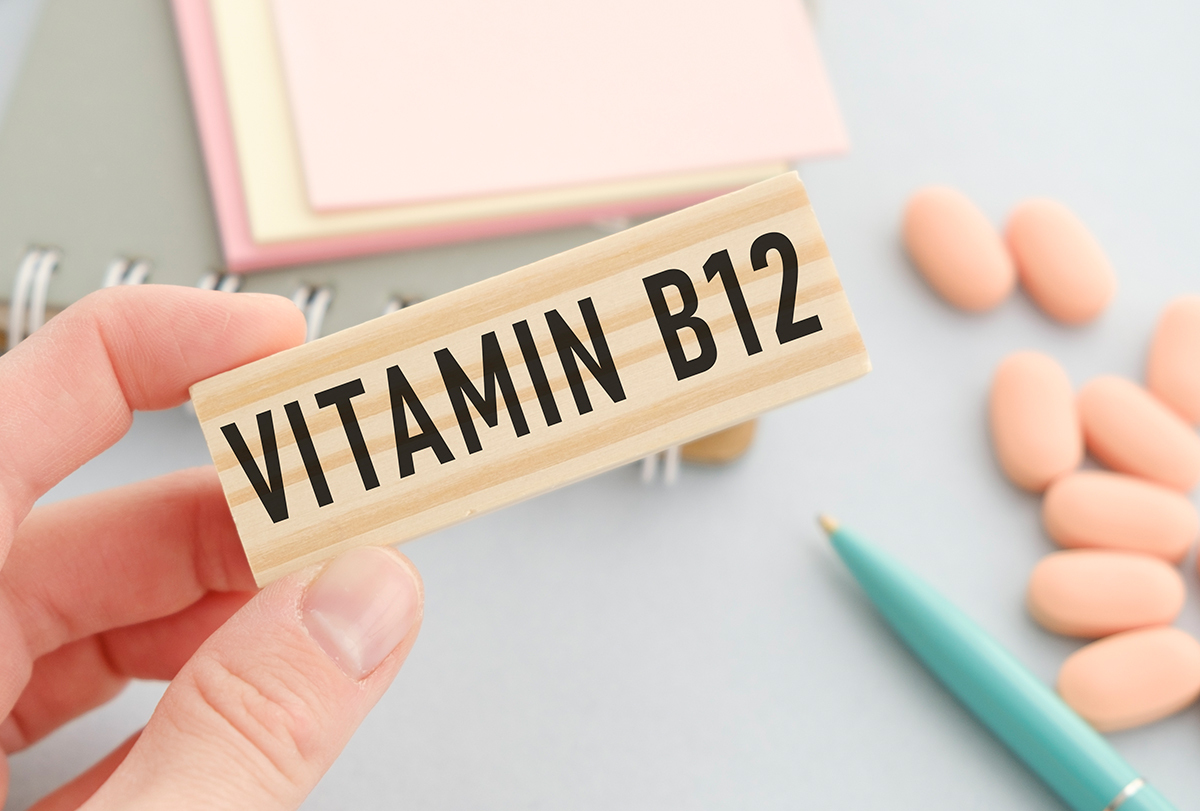
However, you need to consult a dermatologist first to diagnose the root cause of your hair fall before treating it. This article will discuss the role of vitamin B12 in hair growth, and whether its deficiency can trigger hair loss or its supplementation can help reverse it.
What Is Vitamin B12?
B12 is one of the eight B vitamins that form the B complex. These are water-soluble vitamins, which means they easily dissolve in water and are thus quickly absorbed by body tissue.
The body only uses tiny amounts of such vitamins on a daily basis and gets rid of the rest via urine. In other words, water-soluble vitamins such as vitamin B12 are not stored in the body but only absorbed by the tissues for immediate use.
Your hair follicles need certain vitamins and minerals to build strong and healthy hair, but this article will focus on the role of a specific nutrient: vitamin B12.
Does Vitamin B12 Play a Role in Hair Loss
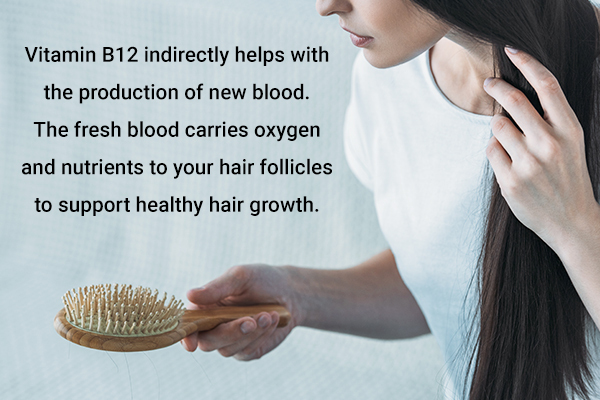
The body uses B12 in combination with folate to synthesize nucleic acid (DNA), which is needed for making red blood cells. Thus, vitamin B12 indirectly helps with the production of new blood.
The fresh blood carries oxygen and nutrients to your hair follicles to support healthy hair growth. Conversely, the poor blood supply can starve your hair follicles of oxygen and nutrients, resulting in weak hair and stunted hair growth.
What Does the Research Say About Vitamin B12 Deficiency and Hair Loss?
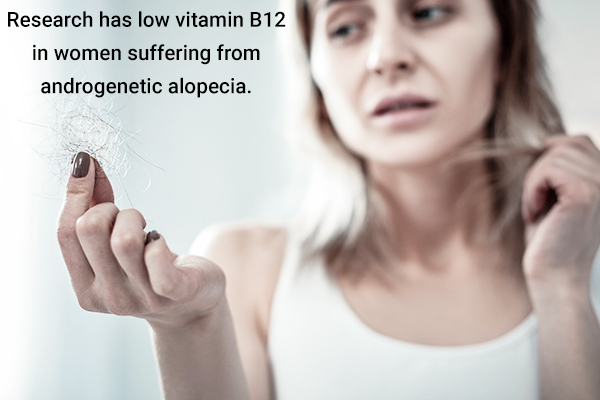
Two different case studies showed that the folate and vitamin B12 levels in the subjects suffering from hair loss and control subjects were quite similar, thereby eliminating the possibility that a deficiency of these nutrients could have triggered the problem. (2)(3)
Another scientific study evaluated the folate and vitamin B12 levels in 115 patients with telogen effluvium (TE). The results showed that only 2.6% of the subjects had vitamin B12 deficiency, but a lack of comparison between the healthy and patient groups is a major limitation of this study. (4)
However, one case study conducted in 1990 reported a reduction in vitamin B12 levels in female subjects suffering from androgenetic alopecia. (5)
All things considered, research exploring the association between vitamin B12 deficiency and hair loss is rather limited and hence cannot produce a reliable conclusion. (6)
Plus, studies conducted on different ethnic groups tend to produce different results that cannot be applied to the general population. So, even though vitamin B12 is considered good for hair health, more rigorous and broad-based trials are needed to confirm if a lack of it can actually impede hair growth or cause hair loss.
Recommended Dietary Allowance
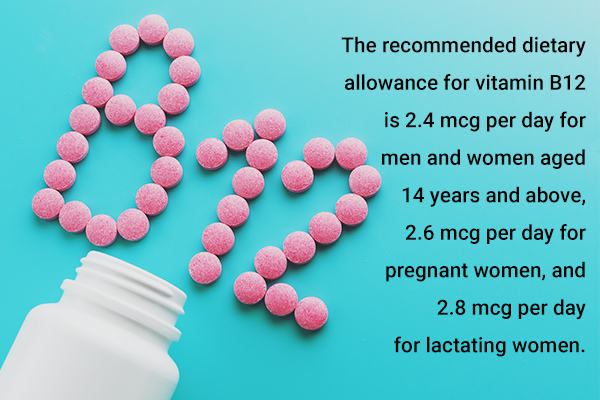
The recommended dietary allowance for vitamin B12 is as follows:
- For men and women aged 14 years and above: 2.4 micrograms (mcg) per day
- For pregnant women: 2.6 mcg per day
- For lactating women: 2.8 mcg per day
Sources of Vitamin B12
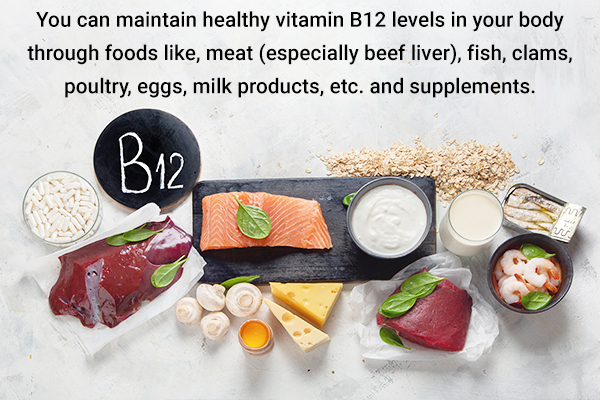
You can derive your recommended intake of vitamin B12 through certain foods, or you can ask your doctor to put you on a supplement if needed. But as discussed earlier, the body only needs small amounts of this vitamin on a daily basis for immediate use and gets rid of any excess, so the need for supplementation rarely arises.
You can easily meet your required intake through diet alone. However, this nutrient is only found in animal-based products because it is produced by a strain of bacteria present inside the gastrointestinal tract of animals and is then absorbed in the tissue of the said animal.
Vegetarians or vegans can consume some plant foods fortified with this vitamin, but that won’t be enough to meet their recommended intake. For this reason, they tend to be deficient and have to rely on supplements.
Moreover, there is an age-related decline in the body’s ability to properly absorb vitamin B12. So, people over the age of 50 years need to consume foods fortified with B12 or take supplements.
You can maintain healthy vitamin B12 levels in your body through the following:
- Dietary sources: Foods rich in vitamin B12 include meat (especially beef liver), fish, clams, poultry, eggs, and milk products. You can also find vegetarian food products fortified with this nutrient, such as some breakfast cereals and nutritional yeasts.
- Dietary supplements: If you are unable to meet your recommended intake of vitamin B12 through the diet, you can ask your doctor to put you on a supplement. This nutrient is available in three different types of supplements: multivitamin supplements, B complex supplements, and purely vitamin B12 supplements.
Final Word
Nutrient supplements are often recommended as a means to prevent or manage hair loss. At the present time, there isn’t enough data to confirm that vitamin B12 supplementation can help prevent or reduce hair loss, and more extensive research is needed.
However, it is always a good idea to get your recommended intake of this vital nutrient, which is credited with multiple hair and health benefits.
- Was this article helpful?
- YES, THANKS!NOT REALLY


